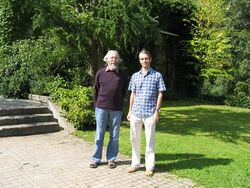Biography:Peter Aczel
Peter Aczel | |
|---|---|
 Peter Aczel (left) with Michael Rathjen, Oberwolfach 2004 | |
| Born | Peter Henry George Aczel 31 October 1941 |
| Died | 1 August 2023 |
| Nationality | British |
| Alma mater | University of Oxford |
| Known for | Aczel's anti-foundation axiom Reflexive sets |
| Scientific career | |
| Fields | Mathematical logic |
| Institutions |
|
| Thesis | Mathematical Problems in Logic (1967) |
| Doctoral advisor | John Newsome Crossley |
| Website | www |
Peter Henry George Aczel (/ˈæksəl/; 31 October 1941 – 1 August 2023) was a British mathematician, logician and Emeritus joint Professor in the Department of Computer Science and the School of Mathematics at the University of Manchester.[1] He is known for his work in non-well-founded set theory,[2] constructive set theory,[3][4] and Frege structures.[5][6]
Education
Aczel completed his Bachelor of Arts in Mathematics in 1963[7] followed by a DPhil at the University of Oxford in 1966 under the supervision of John Crossley.[1][8]
Career and research
After two years of visiting positions at the University of Wisconsin–Madison and Rutgers University, Aczel took a position at the University of Manchester. He has also held visiting positions at the University of Oslo, California Institute of Technology, Utrecht University, Stanford University, and Indiana University Bloomington.[7] He was a visiting scholar at the Institute for Advanced Study in 2012.[9]
Aczel was on the editorial board of the Notre Dame Journal of Formal Logic[10] and the Cambridge Tracts in Theoretical Computer Science, having previously served on the editorial boards of the Journal of Symbolic Logic and the Annals of Pure and Applied Logic.[7][11]
References
- ↑ 1.0 1.1 Peter Aczel at the Mathematics Genealogy Project
- ↑ Moss, Lawrence S. (February 20, 2018). Zalta, Edward N.. ed. The Stanford Encyclopedia of Philosophy. Metaphysics Research Lab, Stanford University. https://plato.stanford.edu/archives/sum2018/entries/nonwellfounded-set-theory/.
- ↑ Aczel, P. (1977). "An Introduction to Inductive Definitions". Handbook of Mathematical Logic. Studies in Logic and the Foundations of Mathematics. 90. pp. 739–201. doi:10.1016/S0049-237X(08)71120-0. ISBN 9780444863881.
- ↑ Aczel, P.; Mendler, N. (1989). "A final coalgebra theorem". Category Theory and Computer Science. Lecture Notes in Computer Science. 389. pp. 357. doi:10.1007/BFb0018361. ISBN 3-540-51662-X.
- ↑ Aczel, P. (1980). "Frege Structures and the Notions of Proposition, Truth and Set". The Kleene Symposium. Studies in Logic and the Foundations of Mathematics. 101. pp. 31–32. doi:10.1016/S0049-237X(08)71252-7. ISBN 9780444853455.
- ↑ {{DBLP}} template missing ID and not present in Wikidata.
- ↑ 7.0 7.1 7.2 "Peter Aczel page the University of Manchester". http://www.manchester.ac.uk/research/Peter.Aczel/.
- ↑ Aczel, Peter (1966). Mathematical problems in logic (DPhil thesis). University of Oxford.(Subscription content?)
- ↑ "Scholars". 14 August 2015. https://www.ias.edu/scholars.
- ↑ Dame, Marketing Communications: Web | University of Notre. "Notre Dame Journal of Formal Logic". https://ndjfl.nd.edu/.
- ↑ "Annals of Pure and Applied Logic". https://www.journals.elsevier.com/annals-of-pure-and-applied-logic/.
External links
 |

